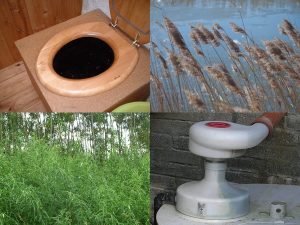Here’s a summary of part 1 of an interview (see video below for more details – well worth it!) with Julian Jones, a water engineer and distinguished fellow of the Schumacher Institute, who has worked and provided consultancy for water companies, NGOs, the Environment Agency, universities and governments. Julian lives in a village near Stroud, and Stroud Commons are talking with him about building a water commons for Stroud. Part 2 is here.
Dave: Welcome Julian.
Julian: Thanks Dave – thanks for inviting me.
D: The water companies seem to be struggling. What’s wrong with the water industry in the UK?
J: it’s a huge problem – analogous to the wider problems in the capitalist system. There’s a conflict of interest between the pursuit of profit and the public interest in the business of water and sewerage – which are fundamental to how we manage our landscapes and catchments: the way we farm, and recycle our nutrients. There’s been a grotesque growth in sewage pollution in the last few years, which will continue to get worse.
How did we get to this situation, and how bad is it?
Faeces / excrement is the biggest source of infectious material – bacteria / parasites etc. So there was always a mismatch between the public interest and the ability of the water companies to continue to put sewage into our rivers. Public health standards have not been applied to our rivers or seas. Sewage overflows happen for a number of reasons, from lack of investment to wet-wipes blocking sewers. But fundamentally, the problem is that we live in a ‘flush and forget’ society, and wastewater services have always been pretty low on the public’s agenda, and there’s been a huge decline in standards. At the time of privatisation, our sewers were licenced to overflow 6 times per year in Stroud. They’re now overflowing 100 times per year.
In the run up to privatisation, Margaret Thatcher cut back on investment in public services, but the water industry required massive investment at the time. And actually, the naturalistic solutions that I prefer are not expensive. They involve treating water with plants. We have 100-year-old willow treatment systems still operating to this day in Gloucestershire. Phytoremediation (cleaning water with plants) has been taken far further forward since Victorian times.

Are you talking mainly about reed beds?
Yes. I’m working on a large local project now, that I was involved with from the start, 30 years ago, using a combination of reed beds and willow beds. The client is very interested in supporting craft work, including basketry, so once a year, willow whips are cropped for basketry. The population that this system serves has quadrupled in the last 30 years, but there’s been no pollution, because the willow and reed beds have held up and captured the nutrients. The design for this system was the same design that we offered the local water company, many years ago, to capture the overflows.
“It is difficult, if not impossible to combine the citizens’ rights and interests and the private enterprise’s interests, because the private enterprise aims at its natural and justified objective, the biggest possible profit.”
– Joseph Chamberlain
We’re talking about bringing the water industry into community ownership – but that will also involve building a much more sustainable and natural water and sewerage system as well?
Yes. Plus the system I’ve described above produces enormous amounts of compost – a fantastic way to not only mop up nutrients to prevent them from polluting rivers and aquifiers, that have been polluted because of our heavily-subsidised chemical farming practices – but also a very valuable resource. Plus we had a big problem with meningitis in Stroud in the 1980s, which is why I was asked to get involved. Research has shown that sewage viruses live for many months in the sea, and for much longer in fresh water. The public health gains in Victorian times due to improvements in sanitation were the greatest of all time – specifically from providing clean drinking water. But sewage overflows into rivers represents a huge threat to public health, and it’s a waste of resources too – it could be turned into hugely beneficial compost.
The process of privatisation, by perpetuating the myth that it’s very expensive to fix our wastewater problems, gave the water companies carte blanche to make colossal profits, because in the regulation, their profits are calculated as a percentage of costs – giving them a huge incentive to increase costs. So they have no interest in low-cost solutions or affordability. And some of the water companies have got themselves into an even bigger hole now, because they’ve taken out crazy loans. One has debts of £14 billion, another one £7.2 billion. To service that debt they need big profits, so they’re even less likely now to want low-cost solutions.
Misconception no. 2 in the privatisation was that the water industry is a natural monopoly. But the water industry is in such a mess, and is so polluting, that a small-scale solution is appropriate.

Talking about scale, you and I are part of a group in Stroud, interested in building the ‘commons’ economy. Is this something that can be applied to the water industry? In other words, can water provision and sewage treatment be owned by communities, rather than by corporations?
Of course. There are lots of small, private water suppliers operating around the country. Wastewater too. Water21 are currently working with a local school that has decided to take control of their surface water drainage. This wasn’t just a decision of the county council, it was a requirement of the 2005 Stroud District planning policy – that any new developments should capture all surface run-off. So they did precisely that, including building a water storage pond within the school grounds. By 2014, their water company hadn’t changed, but their retailer (submitting bills to them) had. They started getting bills for £7500 per month for surface water drainage. But there was none. Their half-acre pond captured all runoff more than adequately. There’s plenty of scope for small-scale, natural commons and/or community-owned water supply and wastewater treatment, providing useful compost, and around 90% cheaper than the hard, civil engineered corporate methods. One of the aims of privatisation was to provide competition. So let’s have some competitive community solutions.
Here are some links for more background :
Resurgence: Back to the Sewage Farm
Stroud News & Journal: Innovative flood prevention scheme could also prove highly lucrative
Huffington Post: Floody Mess – Our Drought of Comprehension
Huffington Post: The Sustainability Scam
Huffington Post: Ludicrous Farmers
Highlights
- There’s a conflict of interest between the pursuit of profit and the public interest in the business of water and sewerage
- Public health standards have not been applied to our rivers or seas.
- There’s plenty of scope for small-scale, natural commons and/or community-owned water supply and wastewater treatment, providing useful compost, and around 90% cheaper than the hard, civil engineered corporate methods.
So – how do we build these community solutions? We believe that it’s now possible to build a water commons. Next week, in part 2, we’ll look at how we might do that.













